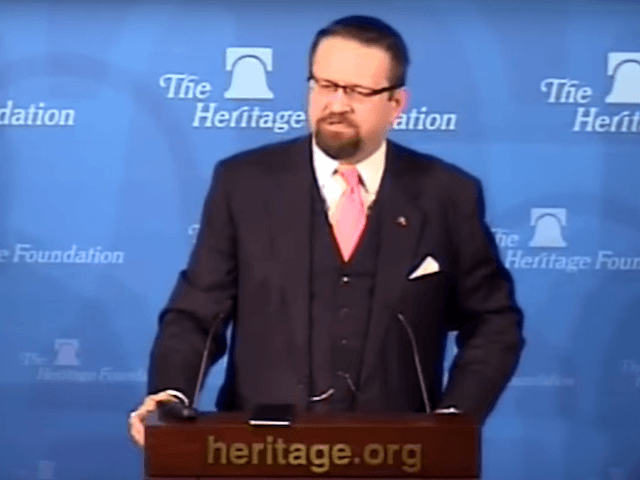Last month, the Forward published an article accusing the forefathers of the Israeli right of Nazi collaboration. It is a false charge that, according to respectable Holocaust scholars, amounts to Holocaust denial.
And yet the same publication is now leading a smear campaign against a pro-Israel and evidently philo-semitic foreign policy adviser to the President of the United States, Sebastian Gorka, accusing him of Nazi ties.
The Forward even seems to suggest Gorka should be stripped of his U.S. citizenship — a cause that has now been taken up by three Democratic U.S. senators.
The Forward claims, in a particularly lousy piece of journalism, that Gorka is a member of a group that was engaged in Nazi collaboration.
It is perhaps not going to surprise many readers of Breitbart News that this claim is utter nonsense. As a Hungarian researcher of 20th century history, and particularly Holocaust history, it is easy to point out the faults with the Forward’s reporting.
While the original Vitézi Rend (which, loosely translated, means “Knightly Order”) was certainly a problematic organization, the group that Gorka’s father, Paul Gorka, was associated with was an entirely different one.
The original order was officially disbanded after the Soviet Union invaded Hungary, with some members continuing to uphold its tradition in exile. Today, at least four offshoots exist, the “original” or “authentic” one run by a Habsburg descendant who lives in Portugal.
Perhaps it need not be emphasized that neither Paul, who was nine years old during the World War Two siege of Budapest, nor his son Sebastian, who was born in London in 1970, could have had anything to do with Nazi crimes.
For further information, I contacted Krisztián Ungváry, a renowned scholar of 20th century Hungarian history, and a vocal critic of the current Hungarian government.
To my inquiry as to whether I was right in saying that the order “did nothing illegal, violent or Nazi-like in emigration,” he gave the following reply: “Yes, I agree. All the problematic things,” of which the order had been accused, “happened before 1945.”
“I can only repeat your statement,” he added. “After 1945, the Order was immersed in the past, had no serious political activity, and it was especially not involved in spying. You can’t call them Nazis because they professed no National Socialistic views.”
One such 1956 veteran who joined the post-war order spoke about it as follows: “I had never been a soldier of [WWII era Hungarian leader Miklós] Horthy’s army. … But they [the Communists] tried to execute me for what I did in 1956. I protected my homeland with my body and my blood. I fought to end the red terror so that it might never occur again, so that no one would have to suffer prison or executions just because his opinions differed. I was arrested seventeen times but was never given a sentence.”
He added that “we had no Nazis or Communists among us, just honest good people.”
Even the Forward article makes it clear that Gorka’s father was never a member of the “original,” “authentic” organization. The group it mentions is merely one of the many offshoots of the original order and was founded after the Second World War, had no role in the Holocaust, and has no known history of violence or illegal activities.
All these various groups share with the original World War II Hungarian group is their name; they were not “under the direction of the Nazi Government of Germany,” in the Forward‘s terms.
The striking absurdity of the Forward’s reporting becomes obvious with the following sentence: “Gorka, who is 46, could not have been part of any World War II killings.”
A clear example of guilt by association — and a worthless one at that: it manages to place Gorka’s name and “World War II killings” in the same sentence.
The Forward’s inauthentic style of reporting is displayed by the audio recording of the conversation it apparently had about Gorka with a member of the so-called Historical Vitézi Rend, which it posted online — but without translating the conversation from Hungarian, creating the appearance of transparency but actually practicing the opposite.
The interviewee called the charges against Sebastian Gorka “highly unfair.” That, however, was not reported in the Forward’s piece.
Perhaps the Forward should atone for its flirtations with Holocaust denial rather than smearing others.
The author is a Hungarian historian doing an MA in Holocaust and Genocide Studies at the University of Amsterdam. He is also a regular contributor to Szombat, the journal of the Hungarian Jewish Cultural Association.

COMMENTS
Please let us know if you're having issues with commenting.